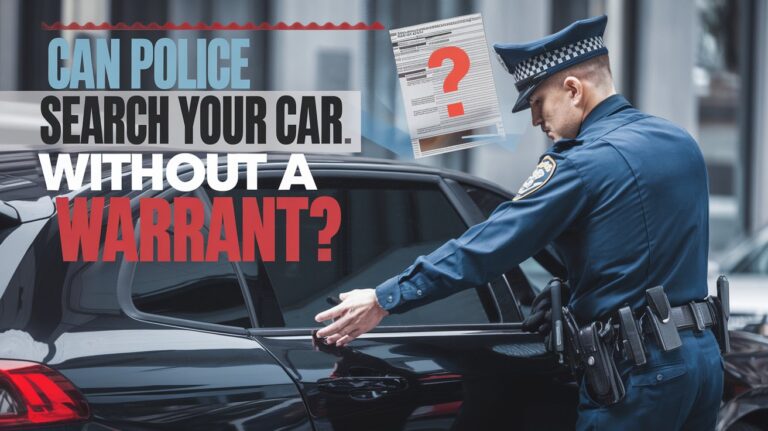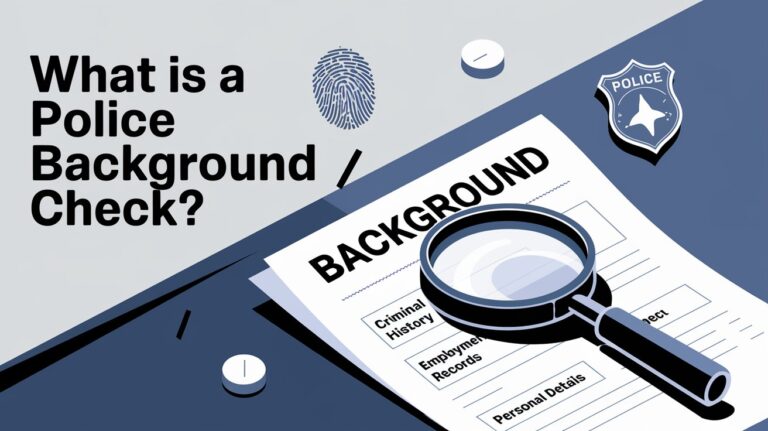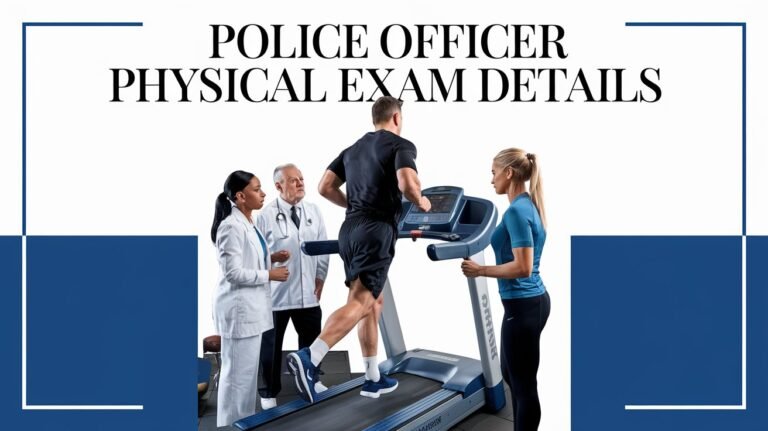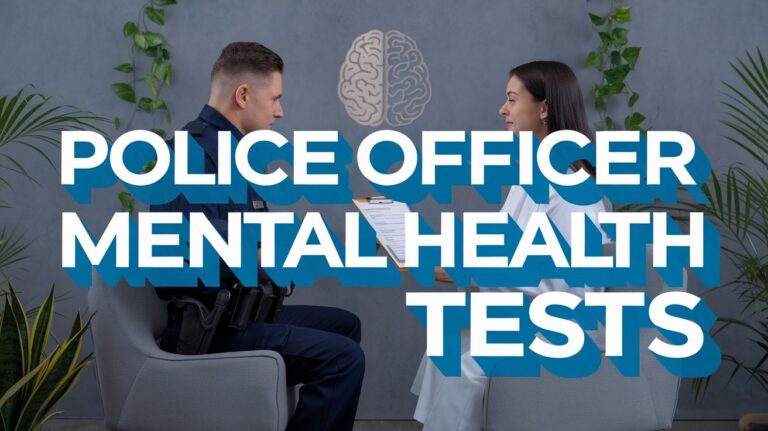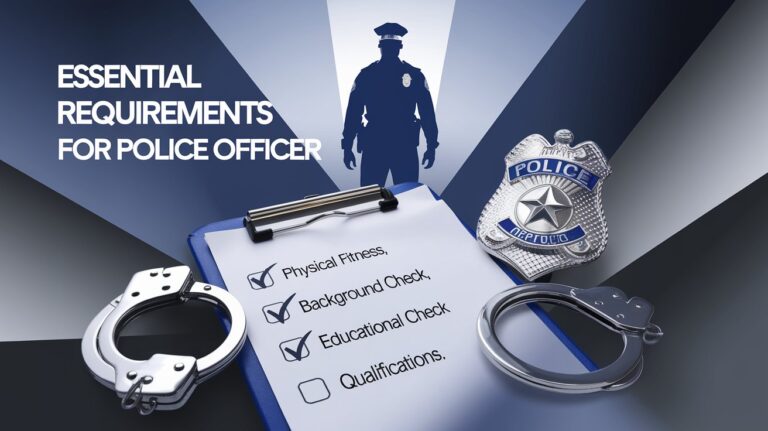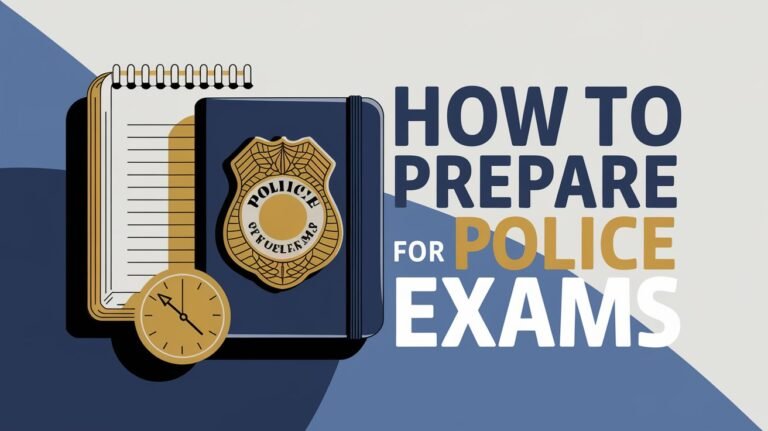Police Officer Written Exam Tips: Succeed with Confidence
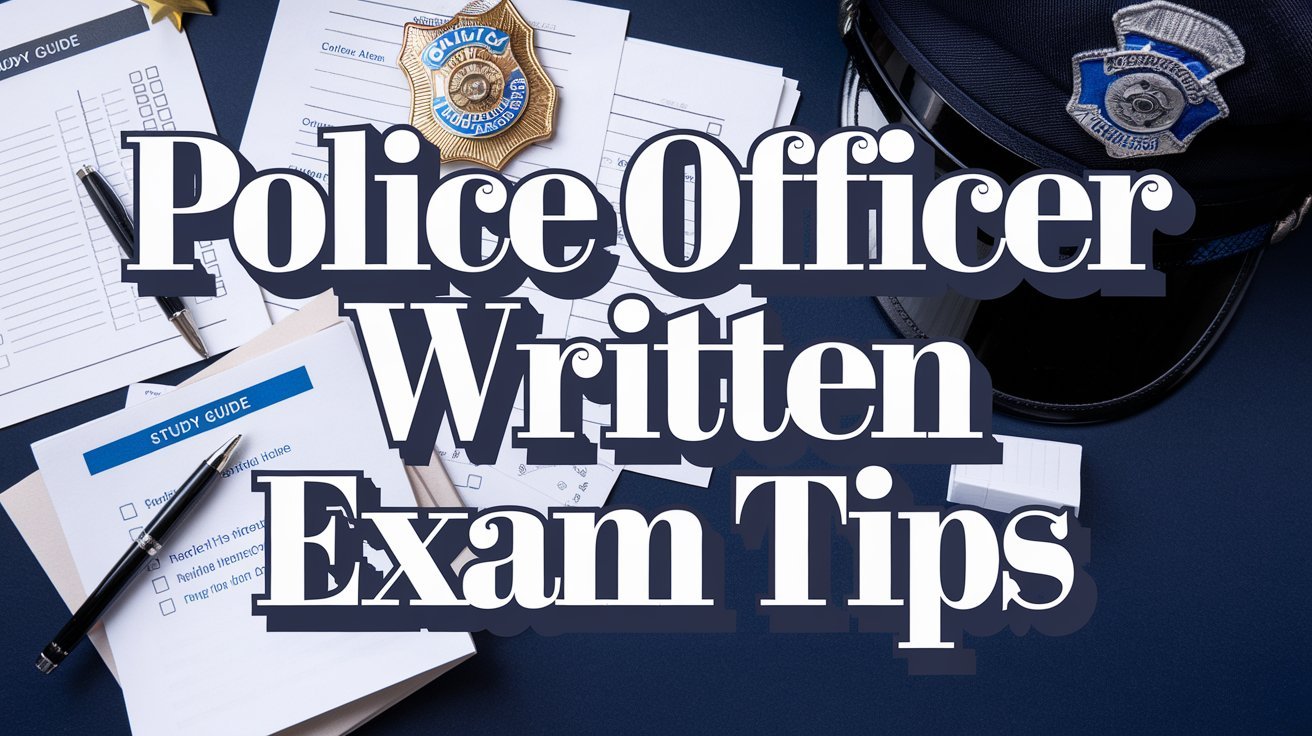
Aspiring police officers face a tough selection process. The written exam is a key part of this. It tests your skills at a 12th-grade level in areas like reading, math, and logical thinking.
To pass, you need a score of 70% or higher. Higher scores can give you an edge in the selection process.
The exam checks if you have the skills needed for a law enforcement career. Knowing the test’s structure and format is important. With good preparation, you can show your competence and stand out in the selection process.
Structure and Format of the Police Written Exam
Aspiring police officers face a key step: the police academy entrance exam. This exam is a part of the civil service exam strategies. It varies by agency but covers similar topics. Knowing the exam’s structure and scoring is key for a good prep plan.
Test Duration and Scoring System
The exam has timed sections, each lasting 15-25 minutes. You’ll answer 10-25 questions in that time. Your score is based on math, reading, language, and writing skills.
To pass, you need a total score of 75% or more. This is across all four areas.
Required Passing Score Thresholds
Agencies often want a score of 80% or higher for a good chance of selection. Those scoring 90% or higher have a better shot. It’s wise to study evenly rather than cramming.
Test Section Breakdown
- Math: About 20 questions on basic math, word problems, and sometimes fractions, decimals, and percentages.
- Reading Comprehension: Around 25 questions on passages to test vocabulary and understanding.
- Language Skills: About 20 questions on grammar, punctuation, and spelling.
- Writing Skills: Usually 10 questions, including short answers and possibly an essay.
Managing your time well is key, but even more so for math. Arrive on time and finish within the time limit to avoid being disqualified.
Essential Math Components for Law Enforcement Tests
Aspiring police officers need to show they can handle math well in the written exam. The math part has about 20 questions to solve in 20 minutes. It covers simple math to complex problem-solving.
Basic Arithmetic and Word Problems
The math section of the police officer exam includes word problems. These problems need basic math like addition, subtraction, and more. You might need to figure out cash, percentages, or distances.
Candidates must quickly understand the problem and use the right math to solve it.
Speed and Distance Calculations
Being good at speed and distance math is key. You might face questions about car accidents or chases. You’ll need to use formulas to figure out speed, time, and distance.
Knowing how to do these calculations is important for the exam and real-life police work.
Percentage and Ratio Problems
Police exams also test your understanding of percentages and ratios. You might need to figure out the value of stolen goods or how to share resources. Being good at these math skills helps you make smart decisions.
To get ready for the math part of the exam, practice basic math, word problems, and speed, distance, percentage, and ratio calculations. Use practice tests and study guides for police officer study guide and math skills for law enforcement to boost your score.
Reading Comprehension Strategies for Success
To do well on the police written exam, you need to be good at reading comprehension. This section has 25 questions and you have 25 minutes to finish. The questions are about police duties, but you don’t need to know law enforcement to answer them. You’ll see true/false statements, multiple-choice questions, and sentence completions.
Sergeant George Godoy has tested over 1,000 people who want to be police officers. He says reading comprehension is very important. Police officers need to understand what they read.
- Look at the answers first to know what to focus on while reading. This helps you stay focused.
- Imagine the events in the passage to help you understand better.
- Highlight important words, dates, names, and events. This helps you remember key information and find details fast.
- Interact with the passage instead of just reading it. This improves your understanding and memory.
- Sum up the main idea of the passage. This helps you answer questions quickly.
Getting ready is key for success in the reading comprehension exercises and the whole police exam reading skills. Use practice exams that have reading comprehension sections. These should be from real police exams.
Police Officer Written Exam Tips: Critical Preparation Steps
To pass the police officer written exam, you need a solid plan. It’s important to spend time and effort on the key parts of the test. This will help you do your best.
Time Management Techniques
Managing your time well is crucial. Know how long the test is and how it’s divided. Start with the questions you know the answers to.
Then, move on to the harder ones. Remember, you get points for every right answer. So, try to answer as many questions as you can.
Practice Test Strategies
Regular practice with real test-like questions is essential. Use tools like the PoliceExam911 Prep Course or the Police Test Bundle from Job TestPrep. They have videos, sample questions, and test-like settings.
Practice often to improve your skills in math, reading, and language. By following these steps, you’ll be ready to ace the police officer written exam. This is a big step towards your dream job in law enforcement.
Language Skills Assessment Breakdown
The language skills section of the police officer written exam tests your ability to communicate well. It focuses on grammar, punctuation, and spelling. These are key for effective communication in law enforcement. You’ll have 15 minutes to answer 20 questions.
There are two main types of questions. Sentence completion tests your knowledge of grammar rules. You’ll choose the right word or phrase to complete a sentence correctly. The other type asks you to find spelling errors, which is important in law enforcement.
- Grammar skills, including verb tense, possessives, and plurals
- Punctuation rules and application
- Commonly misspelled words in a law enforcement setting
By improving your grammar skills for police exams and language proficiency test performance, you show you can write clearly and professionally. This is crucial for any police officer.
Written Communication and Report Writing Excellence
As a police officer, your writing skills are key. You need to write clear and professional reports. This skill is vital for good law enforcement communication.
Grammar and Punctuation Focus Areas
Police reports must be error-free. Make sure your reports have no grammar or punctuation mistakes. Good sentence structure and spelling are crucial for clear and credible reports.
Professional Terminology Usage
Use specific police terms in your reports. Learn and use the right language. This shows you know your stuff and makes reports easy to understand for others.
Good police report writing skills and law enforcement communication are important. They can help you do well in exams and be a better officer. Working on these skills can make you stand out and improve your career.
Memory and Observation Test Components
A key part of the police officer written exam tests your memory and observation skills. These skills are crucial for law enforcement. They help in paying close attention to details and remembering visual information quickly.
This section might ask you to study an image or text for a short time. Then, you’ll answer detailed questions about it without looking at the original material. To do well, it’s important to improve your memory and observation skills.
- Practice techniques for quickly memorizing key details, such as creating mental associations or breaking down information into manageable chunks.
- Develop the habit of systematically scanning and categorizing your observations when studying visual elements.
- Train your mind to ask specific questions about the material you’re trying to commit to memory.
Being good at memorization and observation is not just for the exam. It’s also important for your police work. You’ll need these skills for tasks like writing incident reports, describing suspects, and collecting evidence.
Logical Reasoning and Judgment Scenarios
The police officer written exam tests your logical thinking and judgment. It checks if you can analyze info, make smart guesses, and act right in tough situations. Getting good at this is key to passing the test and doing well in law enforcement.
Situational Analysis Methods
Situational judgment test (SJT) questions give you real-life police scenarios. They ask you to pick the best action. These tests see how you solve problems, make decisions, and handle unclear situations. To do well, get used to SJT questions and practice thinking clearly, considering outcomes, and choosing the right answer.
Decision-Making Frameworks
Logical reasoning questions on the police exam test your critical thinking. They check if you can make smart conclusions from what you’re given. To do well, break down problems, find important facts, and think about possible solutions. Regular practice with sample questions will improve your skills.
| Skill | Description | Importance |
|---|---|---|
| Situational Judgment | Ability to analyze complex scenarios and choose the most appropriate response | Crucial for effective decision-making and problem-solving in policing |
| Logical Reasoning | Capacity to think critically, draw logical conclusions, and make sound decisions | Fundamental for success on the police written exam and in law enforcement duties |
By improving your situational analysis and decision-making, you’ll get better at the logical reasoning and judgment parts of the police exam. Keep practicing with situational judgment test practice and logical reasoning for police exams. This will boost your confidence in these tough areas.
Directional Orientation Test Preparation
Preparing for the police officer written exam means focusing on spatial orientation and directional skills. These skills are tested through questions that check your ability to navigate and understand spatial relationships. By improving these skills, you can confidently face the directional orientation part of the exam.
To do well in this area, try these techniques:
- Reading and interpreting maps: Get to know different map types, like road maps, topographical maps, and city maps. Learn to spot key landmarks, find specific addresses, and trace routes.
- Following written directions: Improve your ability to picture locations and directions from detailed written descriptions. Practice following step-by-step instructions to find your way.
- Visualizing spatial relationships: Work on mentally seeing the layout of objects, buildings, or places. Picture how a scene or layout looks from different angles.
By regularly practicing these skills, you’ll be ready for the directional orientation test in the police officer written exam. Mastering these basic abilities will help you stand out and boost your chances of success.
Physical Abilities Test Connection
The written exam is key in becoming a police officer, but the physical test is just as important. Police departments often give this test after the written one. It’s vital for those aiming for a career in law enforcement to pass both tests.
The physical test includes exercises that mimic real police work. You might do a 1.5-mile run, a 300-meter sprint, push-ups, sit-ups, and vertical jumps. For example, the Houston Police Department (HPD) wants you to run 1.5 miles in 15:54 or less and sprint 300 meters in 78 seconds or less.
To do well, start training early. Try to beat the minimum scores by a bit. For the 1.5-mile run, men should aim for under 9:44 minutes, and women for under 12:30 minutes. Use interval training, sprints, and endurance exercises to boost your fitness.
The test also checks your upper body and core strength. Focus on push-ups and sit-ups to improve. Doing 100 push-ups a day and practicing sit-ups can help a lot.
The physical test is a big part of becoming a police officer. Preparing well for both the written and physical tests shows you’re ready for the job. Stay consistent with your training, pay attention to details, and keep up with your physical fitness to succeed.
Study Materials and Resources Selection
Getting ready for a police exam needs the right study materials and resources. It’s key to use police exam study guides and law enforcement test prep resources made for your exam.
Think about joining online courses like the PoliceExam911 Prep Course or the Police Test Bundle. These courses offer detailed lessons, practice questions, and tips to help you pass the exam.
Also, contact the police department to ask about their study guides or test prep materials. This info can help you understand the exam’s format and what it covers.
Choose study materials that cover all important parts of the police exam. This includes math, reading, grammar, and writing incident reports. Good preparation is crucial for success on test day.
| Recommended Police Exam Study Guides | Useful Law Enforcement Test Prep Resources |
|---|---|
| NYPD Police Officer’s Entrance Exam Test Preparation Kit Police Exam Sample Questions from JobTestPrep Police Exam Practice Questions from Police Tutorial Service 2018 Law Enforcement Entrance Exam Guide with Sample Questions from Go Law Enforcement | PoliceExam911 Prep Course Police Test Bundle Department-specific study guides Comprehensive practice materials covering all exam components |
Test Day Success Protocol
As the big day approaches, it’s crucial to have a solid plan in place. Start by arriving at the exam location early. This allows ample time to review your materials and get mentally focused.
Remember to bring all required identification documents and any other necessary items. The testing agency will have requested these.
The night before the police exam day tips, get adequate rest. Avoid activities that could drain your energy or concentration. Spend some time reviewing key concepts and strategies.
When you arrive at the testing center, remain calm and focused. Manage your time effectively, allocating the right amount for each section of the exam.
If you have time at the end, double-check your answers. This ensures you haven’t made any careless mistakes. By following this structured approach, you’ll be well on your way to acing the police written exam and taking the next step towards your law enforcement career.
FAQ
What is the purpose of the police written exam?
The police written exam checks if you have the basic skills needed for police work. It tests your math, reading, spelling, and grammar at a 12th-grade level.
What topics are typically covered in the police written exam?
You’ll face questions on reading, spelling, grammar, and writing. Math, observation, memorization, and logical reasoning are also tested. Judgment and directional orientation are included too.
What is the structure of the police written exam?
The exam’s structure varies by agency. It usually has four sections. These are math, reading, language skills, and writing. Each section has a time limit, and you need to score at least 75% overall.
How can I prepare for the math section of the police written exam?
The math section has 20 questions in 20 minutes. It covers basic arithmetic and word problems. Practice solving word problems quickly to improve your score.
What strategies can I use for the reading comprehension section?
This section has 25 questions in 25 minutes. Passages related to police duty are provided. Practice reading fast and answering questions based on the passages.
How can I improve my language skills for the police written exam?
The language skills section tests your grammar, punctuation, and spelling. It has 20 questions in 15 minutes. Focus on identifying sentence errors and mastering common misspellings.
What is the importance of written communication skills for police officers?
Police officers need strong written communication skills, like in police report writing. The exam may test your ability to write clear reports. Focus on grammar, punctuation, and professional terms.
How can I prepare for the memory and observation components of the police written exam?
These sections test your memory and observation. Practice quick memorization and attention to detail. This will help you answer questions without referring back.
What types of logical reasoning and judgment scenarios can I expect on the police written exam?
You’ll face questions that test your ability to evaluate information and make logical deductions. Practice analyzing situations and making decisions based on facts.
How can I prepare for the directional orientation component of the police written exam?
This section tests your ability to navigate and understand spatial relationships. Practice reading maps and following directions. Visualize locations based on written descriptions.
What resources are available to help me prepare for the police written exam?
Use study guides and online courses like PoliceExam911 Prep Course or Police Test Bundle. Contact the police department for specific study guides. Invest in materials that cover all exam components.
What should I do on the day of the police written exam?
Arrive early and bring required identification and materials. Get enough rest the night before. Review key concepts and strategies. Stay calm and focused during the test. Manage your time well and double-check your answers if time allows.

